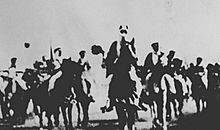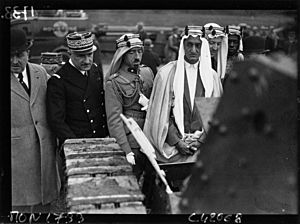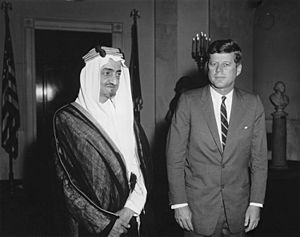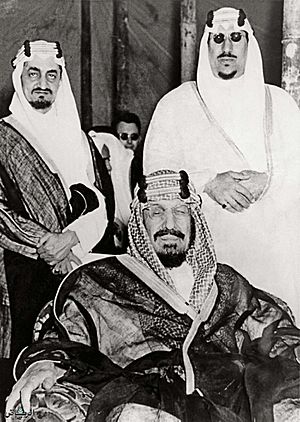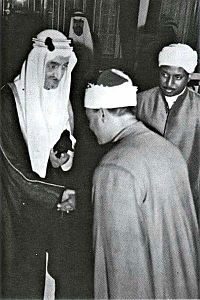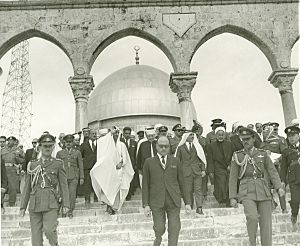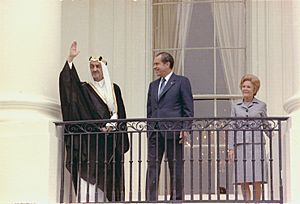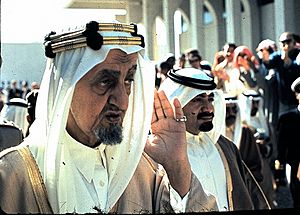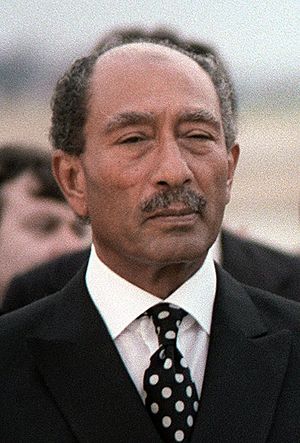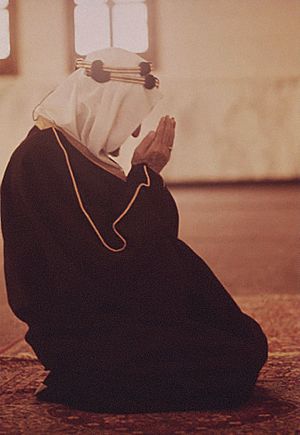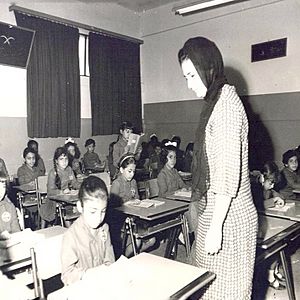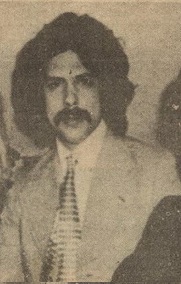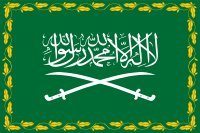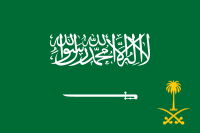Faisal of Saudi Arabia facts for kids
Quick facts for kids Faisal |
|||||
|---|---|---|---|---|---|
| Custodian of the Two Holy Mosques | |||||
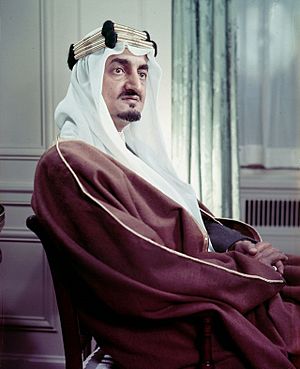
Formal photograph, 1945
|
|||||
| King of Saudi Arabia | |||||
| Reign | 2 November 1964 – 25 March 1975 | ||||
| Bay'ah | 2 November 1964 | ||||
| Predecessor | Saud | ||||
| Successor | Khalid | ||||
| Regent of Saudi Arabia | |||||
| Tenure | 4 March 1964 – 2 November 1964 | ||||
|
Monarch
|
Saud
|
||||
| Prime Minister of Saudi Arabia | |||||
| Tenure | 16 August 1954 – 21 December 1960 | ||||
| Predecessor | Saud bin Abdulaziz | ||||
| Successor | Saud bin Abdulaziz | ||||
| Tenure | 31 October 1962 – 25 March 1975 | ||||
| Predecessor | Saud bin Abdulaziz | ||||
| Successor | Khalid bin Abdulaziz | ||||
| Crown Prince of Saudi Arabia | |||||
| Tenure | 9 November 1953 – 2 November 1964 | ||||
|
Monarch
|
Saud
|
||||
| Predecessor | Saud bin Abdulaziz | ||||
| Successor | Khalid bin Abdulaziz | ||||
| Minister of Foreign Affairs | |||||
| Tenure | 19 December 1930 – 22 December 1960 | ||||
|
Monarch
|
Abdulaziz
Saud |
||||
| Predecessor | Office established | ||||
| Successor | Ibrahim bin Abdullah Al Suwaiyel | ||||
| Tenure | 16 March 1962 – 25 March 1975 | ||||
|
Monarch
|
Saud
Himself |
||||
| Predecessor | Ibrahim bin Abdullah Al Suwaiyel | ||||
| Successor | Saud Al Faisal | ||||
| Viceroy of Hejaz | |||||
| Tenure | 9 February 1926 – 22 September 1932 | ||||
|
Monarch
|
Abdulaziz
|
||||
| Successor | Khalid bin Abdulaziz | ||||
| Born | 14 April 1906 Riyadh, Emirate of Riyadh |
||||
| Died | 25 March 1975 (aged 68) Riyadh, Saudi Arabia |
||||
| Burial | 26 March 1975 Al-Oud cemetery, Riyadh |
||||
| Spouse |
List
Sultana bint Ahmed Al Sudairi
Iffat bint Mohammad Al Thunayan Al Jawhara bint Saud Al Kabir Haya bint Turki Al Turki Hessa bint Muhammad Al Muhanna Aba Al Khail Munira bint Suhaim Al Thunayan Al Mahasher Fatima bint Abdulaziz Al Shahrani |
||||
| Issue Among others ... |
List
Prince Abdullah
Princess Sara Prince Mohammed Prince Saud Prince Khalid Prince Abdul Rahman Prince Saad Prince Bandar Prince Turki Princess Lolowah Princess Haifa |
||||
|
|||||
| House | Al Saud | ||||
| Father | Abdulaziz of Saudi Arabia | ||||
| Mother | Tarfa bint Abdullah Al Sheikh | ||||
| Occupation |
|
||||
| Signature | |||||
| Military career | |||||
| Allegiance | Saudi Arabia | ||||
| Service/ |
Armed Forces of Saudi Arabia | ||||
| Years of service | 1919–1975 | ||||
| Battles/wars |
|
||||
Faisal bin Abdulaziz Al Saud (born 14 April 1906 – died 25 March 1975) was a very important leader in Saudi Arabia. He served as the King of Saudi Arabia from 1964 until his death in 1975. Before becoming king, he was the Crown Prince of Saudi Arabia and also served as the Prime Minister of Saudi Arabia for many years.
Faisal was the third son of King Abdulaziz, who founded modern Saudi Arabia. He was known for making many changes to modernize his country. He worked to improve the government and introduce new ideas. In foreign policy, he focused on bringing Muslim countries together and supporting the Palestinians. He also stood against communism. One of his most famous actions was leading an oil embargo in 1973 to protest Western support for Israel. This event caused a big change in the world's economy. Faisal's rule was popular in Saudi Arabia, even with his reforms. His life ended suddenly in 1975, and his half-brother Khalid became king.
Contents
Early Life and Learning
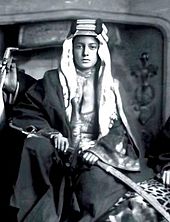
Faisal bin Abdulaziz was born in Riyadh, Saudi Arabia, on 14 April 1906. He was the third son of Abdulaziz bin Abdulrahman, who was then the ruler of the Nejd region. Faisal's mother, Tarfa bint Abdullah Al Sheikh, came from a family of important religious leaders. She passed away when Faisal was only six months old.
After his mother's death, Faisal was raised by his maternal grandparents. They taught him a lot about the Quran, which is the holy book of Islam, and Islamic law. By the age of nine, he had completed these studies. His father also taught him how to ride horses and about politics. From a young age, Faisal was chosen to represent his father in important meetings with other countries.
In 1919, when Faisal was just thirteen, he visited London, England. This made him the first Saudi royal to visit England. He also visited France during this time. These trips helped him learn about other cultures and governments.
Early Political Work
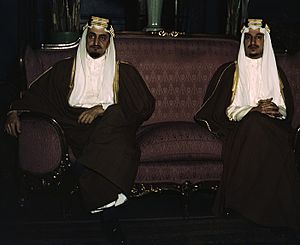
As one of his father's older sons, Faisal was given many important jobs. In 1922, he led a military campaign to take full control of the Asir region. This showed his skills as a leader.
Viceroy and Foreign Minister
In 1926, Prince Faisal was made the viceroy (a ruler acting for a king) of Hejaz. He worked closely with local leaders there. In 1931, he also became the minister of foreign affairs, meaning he was in charge of Saudi Arabia's relationships with other countries. He held this job for most of his life.
Faisal traveled to many countries, including Iran, Poland, Russia, and Turkey. In 1932, he officially announced the creation of the Kingdom of Saudi Arabia on behalf of his father. He also led a successful campaign during the Saudi–Yemeni War in 1934. In 1943, he visited the United States with his half-brother Khalid, which was an early step in building ties between the two countries.
His father, King Abdulaziz, saw Faisal as a very smart and capable son. He often said he wished he had "three Faisals." Abdulaziz trusted Faisal with important tasks in both war and diplomacy.
Crown Prince and Prime Minister
When King Abdulaziz passed away in 1953, Faisal's older half-brother, Saud, became king. Faisal was then named the Crown Prince, meaning he was next in line to the throne. In 1954, he also became the Prime Minister of Saudi Arabia.
King Saud spent a lot of money, which caused financial problems for the country. Many members of the royal family and religious leaders felt that Saud was not handling things well. So, in 1958, they pressured King Saud to give Faisal more power as Prime Minister.
There was a struggle for power between Saud and Faisal. In 1960, Faisal resigned as prime minister because he felt Saud was stopping his financial reforms. But in 1962, Faisal gained enough support to become prime minister again. Just before this, he met with U.S. President John F. Kennedy.
In 1962, Faisal announced the "Ten Point Program." This plan aimed to make Saudi Arabia a modern, industrialized nation. Some key points included:
- Creating a basic system of government based on Islamic law.
- Making the justice system independent.
- Improving the lives of Saudi people with free medical care and education.
- Developing the economy and building roads.
- Continuing to support education for girls and women.
- Ending slavery completely in Saudi Arabia.
Faisal also helped set up important organizations like the Islamic University of Madinah in 1961 and the Muslim World League in 1962. In 1963, he started the country's first television station, though it didn't begin broadcasting until two years later.
Becoming King
The struggle between Faisal and King Saud continued. Saud had put the country in debt and caused problems with other nations. In early 1963, while Saud was away for medical reasons, Faisal took more control. He replaced many of Saud's supporters with his own.
When Saud returned, he didn't like these changes. Faisal then called a meeting of important royal family members, religious leaders, and tribal elders. They all supported Faisal. The Grand Mufti, a top religious leader, issued a religious ruling asking Saud to give up his power.
Faisal initially wanted Saud to keep his title as king but give up his power. However, Saud ordered his royal guards to surround his palace. Faisal responded by having the National Guard surround Saud's palace. Saud eventually gave in. On 4 March 1964, Faisal was made regent (a person who rules when the king cannot). Later that year, the royal family and religious leaders decided that Saud should step down completely.
On 2 November 1964, Faisal was officially declared King. Saud then went to live in other countries.
Ending Slavery
One of Faisal's most important actions as Crown Prince was to end slavery in Saudi Arabia. In 1962, he issued a decree that completely abolished slavery. The government even paid to free many enslaved people.
King of Saudi Arabia
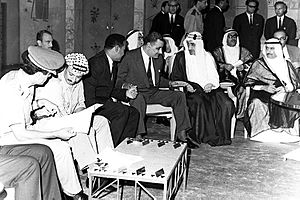
As king, Faisal quickly set up a council to plan for future leaders. He also made new laws for media and publishing. In 1970, he created the Ministry of Justice and started the country's first "five-year plan" for economic growth.
Television broadcasts officially began in 1965. While some people were unhappy with these social changes, Faisal was respected in the Arab world for modernizing Saudi Arabia. He also managed the holy cities of Mecca and Medina well and was known for opposing Zionism.
Protecting the Country
In the 1950s and 1960s, many countries in the region experienced coups d'état (when a group suddenly takes power). To protect Saudi Arabia, Faisal built a strong security system and dealt firmly with anyone trying to cause trouble. He always explained his actions using Islamic principles. When asked for a written constitution, he famously said, "Our constitution is the Qur'an." In 1969, he ordered the arrest of many military officers who were planning a coup.
Religious Views
Faisal believed in including different religious groups. He worked to bring together different Muslim communities. He also included people from various regions and religious backgrounds in his government. He famously told religious leaders that "All Muslims, from Egypt, India etc. are your brothers."
Even though Faisal was a very religious man, he reduced the power of some religious officials. He wanted to prevent radical clerics from controlling religious institutions. Because of his strong faith, he was able to introduce careful social reforms, like education for girls. He talked with conservative groups to convince them that progress was important.
Care for Holy Sites
Faisal oversaw major expansions of the Masjid al-Haram (the Grand Mosque) in Mecca, which had not been significantly enlarged in a thousand years. He made sure that old structures were preserved while new parts were added. He also ordered the reopening of the Kaaba Cloth Factory in Mecca.
In 1965, Faisal approved plans to renovate the Maqam Ibrahim, making it easier for pilgrims to perform rituals. He also ordered the construction of new prayer areas at the Prophet's Mosque in Medina. In 1964, he sent the Saudi Binladin Group to East Jerusalem to help restore the Dome of the Rock.
Foreign Policy
As king, Faisal used Islam as an important tool in his foreign policy. He kept a close alliance with the United States, relying on them for military training and weapons. Faisal was strongly against communism and refused to have political ties with the Soviet Union. He believed communism and Islam were completely different. His first official visit as king to the U.S. was in June 1966.
Supporting Palestine
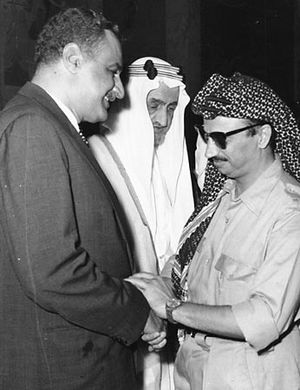
Prince Faisal was known for supporting the Palestinian cause from early on. In 1938, he represented his father at a conference in London about Palestine, where he spoke against dividing the land. He always believed that the Palestinian issue was a major problem for Arab peace. He worked to unite Arab efforts, refused to recognize Israel, and encouraged Muslims to defend the cause.
Al-Aqsa Mosque Fire
In 1969, after an arson attack on the Al-Aqsa Mosque in Jerusalem, Faisal called a conference in Rabat, Morocco. Leaders from 25 Muslim countries attended. They called for Israel to give back land taken in 1967. This conference also led to the creation of the Organisation of Islamic Cooperation, which supports Palestinians.
North Yemen Civil War
The North Yemen Civil War (1962-1970) was a conflict between those who supported the old kingdom and those who wanted a republic. Saudi Arabia supported the royalists, while Egypt supported the republicans. This caused tension between Saudi Arabia and Egypt.
In 1964, Faisal met with Egyptian President Gamal Abdel Nasser. They agreed to work together to solve the conflict in Yemen peacefully. They met again in 1965 and signed the Jeddah Agreement, which planned for Egyptian troops to leave Yemen and for Saudi Arabia to stop helping the royalists. This agreement helped improve relations between the two countries.
Six-Day War
During the Six-Day War in 1967, Faisal ordered the Saudi army to be ready. He sent 20,000 Saudi soldiers to Jordan to help Arab forces. After the war, he kept Saudi troops in Jordan for ten years to provide support. Saudi Arabia also contributed a large amount of money to help countries affected by the war.
It is said that after Jerusalem fell to the Israelis in 1967, Faisal never smiled again. He became very quiet and thoughtful.
Ramadan War and Oil Embargo
After Egyptian President Nasser died in 1970, Faisal became close to his successor, Anwar Sadat. When Sadat launched the 1973 Arab–Israeli War, Faisal took a bold step. He withdrew Saudi oil from world markets. This action, known as the oil embargo, was a protest against Western countries supporting Israel during the conflict.
The embargo caused oil prices to rise dramatically. This was seen as the most important act of Faisal's career and earned him great respect among Arabs and Muslims worldwide. In 1974, Time magazine named him "Man of the Year." The new oil money also allowed Faisal to greatly increase aid to Egypt, Syria, and the Palestine Liberation Organization.
Many people in Saudi Arabia and the Arab world believe that Faisal's oil embargo was the real reason for his assassination, suggesting a Western conspiracy.
Personal Life
Faisal married several times. His wives came from powerful families. One of his most influential wives was Iffat bint Mohammad Al Thunayan, who was born in Turkey. They had nine children, including Prince Mohammed, Prince Saud, and Prince Turki. Iffat is often credited with inspiring many of Faisal's reforms, especially those related to women's rights and education.
Faisal made sure his children received excellent education, often abroad. Unlike many of his relatives, his children went on to hold important roles in Saudi society and government. For example, his son Khalid became a governor, Prince Saud was the foreign minister for many years, and Prince Turki served as head of intelligence and an ambassador. His daughters, like Sara, Lolowah, Latifa, and Haifa, also became important activists for women's education and social issues.
Faisal was known for speaking fluent English and French, though he preferred to speak Arabic. He would even correct his translators if they made mistakes.
Personality
Faisal was known for being honest, humble, and kind. He avoided showing off wealth and lived a simple life. He enjoyed falconry, hunting, reading, and poetry. After becoming king, he worked long hours and dedicated himself to state affairs.
His Death
On 25 March 1975, King Faisal's life ended suddenly. He was shot by his nephew, Prince Faisal bin Musaid. The event happened during a majlis, which is a public meeting where the king listens to his citizens.
Prince Faisal bin Musaid approached the King and shot him. The King was quickly taken to a hospital, but doctors could not save him. He passed away shortly after. The country observed three days of mourning. King Faisal was buried in the Al Oud cemetery in Riyadh.
One theory for the killing was revenge. Prince Faisal bin Musaid's brother, Prince Khalid bin Musaid, had been killed by police in 1966 during a protest against the new television station that King Faisal had introduced.
After the attack, Prince Faisal bin Musaid was captured. After a trial, he was found guilty and sentenced to death. He was publicly beheaded in Riyadh.
Remembering King Faisal
After his death, Faisal's sons created the King Faisal Foundation, a charity organization, in his honor. Many things have been named after him. In 1976, King Khalid started building the Faisal Mosque in Pakistan. In 1979, the city of Lyallpur in Pakistan was renamed Faisalabad (meaning "City of Faisal"). One of Pakistan's air force bases is also named "PAF Base Faisal."
Books have been written about Faisal's life, and a movie called Born a King (2019) tells the story of his visit to London when he was thirteen.
Images for kids
See Also
 In Spanish: Fáisal bin Abdulaziz para niños
In Spanish: Fáisal bin Abdulaziz para niños
 | Tommie Smith |
 | Simone Manuel |
 | Shani Davis |
 | Simone Biles |
 | Alice Coachman |


